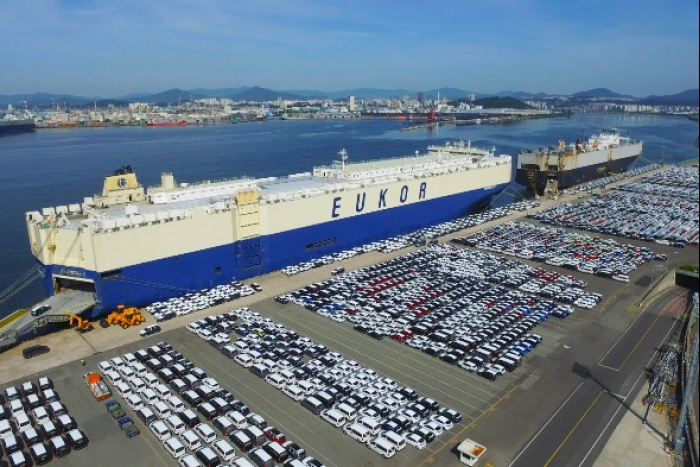Korean stock market
Auto shares bounce back with foreigners' net buying
The global chip shortage is expected to ease in Q2; the two major carmakers' performances were robust despite the war in Ukraine
By Apr 14, 2022 (Gmt+09:00)
3
Min read
Most Read
Hankook Tire buys $1 bn Hanon Systems stake from Hahn & Co.


NPS to hike risky asset purchases under simplified allocation system


UAE to invest up to $1 bn in S.Korean ventures


Osstem to buy BrazilŌĆÖs No. 3 dental implant maker Implacil


US multifamily market challenges create investment opportunities



Korean top automaker Hyundai Motor Co. shares rose by 1.69% to 181,000 won ($147.84) on Wednesday of this week. From March 15 to April 13, shares of Hyundai Motor and KoreaŌĆÖs No. 2 carmaker Kia Corp. jumped 11.04% and 12.57%, respectively, while the main bourse Kospi rose only 3.62% during the same period.┬Ā┬Ā
Korean car shares have weakened since the second half of 2021 amid growing concerns over chip shortage-driven performance deterioration. Some automaking plants, including Hyundai Motor and GM Korea Co., the Korean unit of US auto giant General Motors Co., were suspended last year because of chip shortage problems.
The Russia-Ukraine war has also worsened car shares -- the combined sales of Hyundai and Kia cars in Russia plunged by 68% in March, compared with the same month last year, according to the Association of European Businesses (AEB). Hyundai and Kia shares hit 52-week lows on March 15, respectively, closing at 162,000 won and 68,100 won.
SHARES DEFENSIVE TO WAR AND CHIP SHORTAGE
The auto shares are set to bounce back as the chip constraint will ease later this year. "Global automotive chip makers, such as NXP Semiconductors N.V., Infineon Technologies AG and STMicroelectronics N.V., are expanding facility investments. They will produce chips from the increased facilities from the second half of this year,ŌĆØ said Kim Joon-sung, an analyst at Meritz Securities Co. ŌĆ£The Shanghai Containerized Freight Index (SCFI) has recently slid, and global logistics bottlenecks are looking to ease later this year,ŌĆØ said Kim.┬Ā┬Ā
Despite the sales slump in Russia, the performances of Hyundai Motor and Kia weren't deeply hurt for the first three months of this year. Hyundai MotorŌĆÖs global wholesale sales during the first quarter were 902,000 units, down 9.7% from the same period of 2021. KiaŌĆÖs in the first quarter were 685,000 units, down only 0.7% from the same period of the last year.
The automakersŌĆÖ performances are expected to improve on their strategy to increase luxury car sales and the weakened Korean won. KiaŌĆÖs operating profit in the first quarter is estimated to have risen 15.2%, compared with the same period of 2021, according to financial information provider FnGuide.┬Ā
LOWERED VALUATIONS, HIGHER TARGET PRICE
Foreigners are betting on Hyundai Motor shares. From April 1 to 13, they turned to buy a net 34.4 billion won worth of the automaker's shares while selling a net 2.5 trillion won on the Kospi. Foreign shareholders of Hyundai Motor had been on a net-selling spree during the first three months of 2022 -- they sold a net 179.4 billion won in January, 414.6 billion won in February and 265.9 billion won worth of its shares in March.┬Ā
Foreigners hold a 26.56% stake in Hyundai Motor as of April 12, down from 28-31% in 2021 and over 40% in 2019. To bring foreign investorsŌĆÖ holding rate up to 30%, Hyundai Motor has to sell more of its shares worth 1.3 trillion won, based on the current stock price, to the investors.
The major carmakersŌĆÖ valuations have lowered enough to attract new investors. The firmŌĆÖs 12-month forward price-earnings ratio is 7.8 times, compared with 10-11 times a year ago. KiaŌĆÖs is 5.7 times, compared with 7.8 times a year ago. Some positive outlooks are also expected to boost the stocks┬Ā -- Morgan Stanley recently raised the target price of Hyundai Motor from 260,000 won to 270,000 won and that of Kia from 80,000 won to 85,000 won.
Write to Hyeong-Gyo Seo at seogyo@hankyung.com
Jihyun Kim edited this article.
More to Read
-
 AutomobilesHyundaiŌĆÖs Chung named auto industry Visionary of the Year
AutomobilesHyundaiŌĆÖs Chung named auto industry Visionary of the YearApr 13, 2022 (Gmt+09:00)
1 Min read -
 Electric vehiclesHyundai to build EVs at US plant; Electrified GV70 to roll out in Dec.
Electric vehiclesHyundai to build EVs at US plant; Electrified GV70 to roll out in Dec.Apr 13, 2022 (Gmt+09:00)
3 Min read -
 AutomobilesHyundai Motor, Kia rank fifth in global electric vehicle sales
AutomobilesHyundai Motor, Kia rank fifth in global electric vehicle salesApr 06, 2022 (Gmt+09:00)
2 Min read -
 Korean stock marketHyundai Motor shares set to rebound after hitting trough
Korean stock marketHyundai Motor shares set to rebound after hitting troughMar 31, 2022 (Gmt+09:00)
3 Min read -

Comment 0
LOG IN


